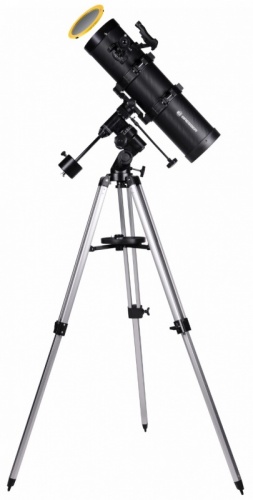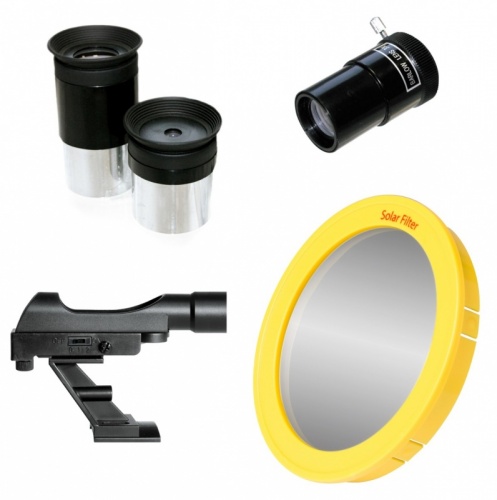Sun, Moon, planets, deep sky - this entry-level telescope with extensive astronomy accessories is the perfect all-rounder for your easy start.
Complete set of telescope, tripod, mount and many accessories for starting immediately
Easy to use reflector telescope for beginners
Fine adjustment with flexible shafts in 2 axes
Telescope aperture: 130 mm; focal length: 650 mm
Very versatile, suitable for Moon, planets, deep sky objects and Sun with safe objective solar filter
Enables astrophotos using smartphones
Set off in search of your own fascinating discoveries at the night sky. This starter set comes with everything you need for your first astronomical observations: reflector telescope with 130 mm aperture and 650 mm focal length, equatorial mount, tripod and comprehensive astronomical accessories. The system is very easy to use and extremely versatile. It is suitable for observing the Moon, the Sun and the planets as well as star clusters and gas nebulae. Ideal for your easy start in sky observation!
Astro all-rounder for beginners - the telescope
The astronomical telescope is a classic reflector telescope, a so-called Newtonian reflector. One characteristic of this particular type: They are designed to look in at the front and from the side instead of the rear. Thus, the observation position always remains comfortable, even when the tube is pointed vertically into the sky. Once familiar with it, the telescope is also very easy to use. These reflector telescopes also have one important advantage regarding their optics: they are free of chromatic aberrations and thus offer good imaging properties.
With its 130 mm aperture, this entry-level telescope already collects a lot of light from celestial objects. In addition, 130 mm aperture and 650 mm focal length result in a short focal ratio (ratio of aperture to focal length) of 1 to 5 (F/5). This allows you to marvel at a bright image through this fast telescope. It also allows for high magnifications, making the beginner's telescope a flexible all-rounder for sky observing. Enjoy the full range of astronomical highlights: At low to medium magnification, take in open and globular clusters such as M13 in the constellation Hercules. Or you can admire gas nebulae such as the famous Orion Nebula M42. At high magnifications, on the other hand, observing the planets or details on the Moon becomes an absolute pleasure.
The 130 mm aperture offers a resolution which allows you to admire your favourite celestial objects in sharp images at magnifications of up to about 260x. Technically, even more is possible - theoretically up to 487.5x with the included accessories. However, the image sharpness can then slowly decrease with increasing magnification. Nevertheless, how much you can really magnify, depends not only on your telescope. The air turbulence in the atmosphere (seeing conditions) is also always an important factor in your astronomical observations.
Please note that reflecting telescopes of the "Newton" type always produce images both laterally reversed and upside down. This does not matter for astronomical observations, which is why these telescopes are very well suited for these purposes. For nature and landscape observations during the day, however, this characteristic is disruptive. Therefore, we recommend the BRESSER refracting telescopes for this application.
User-friendly and stable - mount and tripod
Have you found the perfect place for your observations? Then just attach the telescope to the equatorial mount and the height-adjustable aluminium tripod. The advantage of this type of mount: unlike azimuthal models, the movement of the celestial bodies has to be counterbalanced on just one axis. For this purpose, one axis is aligned parallel to the Earth's axis by pointing it approximately at the polar star. Adjustment and tracking of the telescope is particularly precise and comfortable via the two flexible shafts with fine adjustment. And your accessories stay always within reach on the storage plate attached to the tripod.
Keep track of things automatically: For this telescope’s equatorial EQ-3 mount, the tracking motor with item number 4951400 is available as an optional accessory. This eliminates the need to manually track a celestial object set in the telescope. When this motor is installed at the mount, it automatically tracks the celestial object, keeping it in the field of view of the eyepiece. This makes observing the night sky even more comfortable!
Complete astronomy starter package - the accessories
Unpack and get started straight away - the beginner's telescope comes with lots of accessories. The LED viewfinder enables you to navigate the night sky with ease. This direction finder is installed on the telescope and projects a red dot onto a small ground-glass screen. When you look through it, the red dot appears to be floating at the exact location in the sky to which the telescope is pointed. Thus, the LED viewfinder allows you to easily find celestial objects and accurately align the telescope.
Different perspectives of the night sky: With the two eyepieces included, you are able to view astronomical objects at different magnifications. With the standard 31.7 mm (1.25 inch) diameter sockets, they are simply inserted into the telescope's focuser. Do you want an even more detailed image? Then the 3x barlow lens can triple the magnification.
However, during the day taking a look at the sky is also worthwhile: with the solar filter you can safely observe sunspots and granulation on our very own star.
CAUTION: Never point the telescope at the Sun without the solar filter!
Whether Sun, Moon, planets or deep sky objects - with the smartphone adapter you can capture your most fascinating moments on intriguing snapshots. Simply slip it over the eyepiece and take your first steps in astrophotography!
FEATURES
Reflector telescope with 130 mm aperture and 650 mm focal length
Reflector type Newton
Well suited for observing Sun, Moon and planets as well as star clusters and gas nebulae
Height-adjustable tripod with equatorial EQ3 mount
Precise adjustment through flexible shafts with fine adjustment in both axes
Easy to use, very good for beginners
Focal ratio F/5, thus well suited for many celestial objects
31.7 mm (1.25 inch) focuser
Two eyepieces and one barlow lens with 31.7 mm (1.25 inch) sockets for different magnifications
Safe solar observation with the included solar filter
First steps in astrophotography with smartphone camera adapter
SCOPE OF DELIVERY
Telescope
Aluminium tripod
Equatorial EQ3 mount
Eyepieces: 4 mm and 20 mm (1.25-inch socket)
Barlow lens 3x (1.25-inch socket)
LED illuminated dot viewfinder
Solar filter
Smartphone camera adapter
Accessory tray
Astronomy software download
Instruction manual





















 Fast & Reliable Delivery
Fast & Reliable Delivery Helpful & Friendly Staff
Helpful & Friendly Staff Best Prices Online
Best Prices Online 100% Secure Shopping
100% Secure Shopping